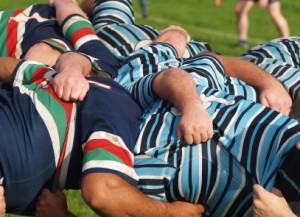A Quick Test to Detect Athletes’ Concussions
 Some sports such as football are particularly violent and many players suffer concussions. Concussions can cause a variety of physical, cognitive, and emotional symptoms. Although symptoms usually go away within a few weeks without treatment, they may persist, or complications (such as dementia) may occur. Recent evidence shows that even hits to the head that do not lead to a concussion can impair visual memory. Detecting concussions is thus becoming critical in high-contact sports.
Some sports such as football are particularly violent and many players suffer concussions. Concussions can cause a variety of physical, cognitive, and emotional symptoms. Although symptoms usually go away within a few weeks without treatment, they may persist, or complications (such as dementia) may occur. Recent evidence shows that even hits to the head that do not lead to a concussion can impair visual memory. Detecting concussions is thus becoming critical in high-contact sports.
A new test that can be performed at the sideline of sporting events seems to accurately detect concussions by looking at different types of eye movements that are usually abnormal after a concussion:
The test, called the King-Devick test, captures impairments of eye movement, attention, language and other symptoms of impaired brain function.
Tests of rapid number naming such as the King-Devick test are objective and capture many aspects of function. This may help coaches and athletic trainers determine whether players should be removed from games or not.
Keep reading to learn about the latest study using this test and the complexity of detecting concussions.


